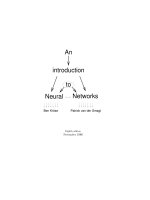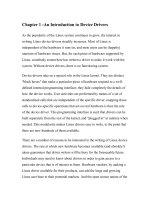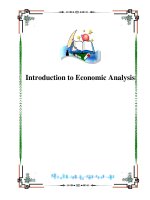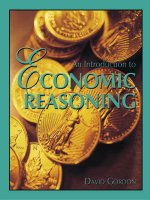An Introduction to Economic Reasoning ppt
Bạn đang xem bản rút gọn của tài liệu. Xem và tải ngay bản đầy đủ của tài liệu tại đây (1.53 MB, 210 trang )
An Introduction to
Economic Reasoning
David Gordon
Ludwig von Mises Institute
518 West Magnolia Avenue
Auburn, Alabama 36832-4528
Copyright © 2000 Ludwig von Mises Institute. All rights reserved.
Published by the Ludwig von Mises Institute, 518 West Magnolia Avenue, Auburn,
Alabama 36832-4528. (www.mises.org)
ISBN: 0-945466-28-5
D
edicated to
Quintin E. and Marian L. Ward,
with deepest gratitude.
I
am first of all indebted to Mr. and Mrs. Quintin E. Ward, whose
generous support made this book possible. Mr. Ward’s career and
achievements exemplify the free market in action.
For very helpful comments on the manuscript, Ithank Hans
Hoppe, Jeffrey Herbener, Joseph Salerno, and Mark Thornton.
They bear no responsibility for any remaining mistakes.
At the Mises Institute, Judy Thommesen and Kathy White han-
dled editorial work in the manuscript with great skill. I thank Mises
Institute Member Richard Perry for preparing the index. Pat
Barnett, as always, was a constant source of encouragement. She
also provided me with helpful comments and corrections. The pres-
ident of the Mises Institute, Lew Rockwell, not only commissioned
the project: he nudged it along through gentle prodding. To all of
these, many thanks.
Acknowledgements
Table of Contents
INTRODUCTION i
1 THE METHOD OF ECONOMICS 1
2 ACTION AND PREFERENCE, PART 1 15
3 ACTION AND PREFERENCE, PART 2 35
4 DEMAND AND SUPPLY 55
5 THE LABOR THEORY OF VALUE 83
6 PRICE CONTROLS 103
7 MINIMUM WAGES AND WAGE CONTROL 117
8 MONEY, PART 1 131
9 MONEY, PART 2 147
10 THE GOLD STANDARD 161
CONCLUSION 175
GLOSSARY 177
RECOMMENDED READINGS 185
INDEX 187
W
hy, indeed? A good short answer is that you can’t get away
from it. Almost everything you do involves economics. Why
do people have to earn a living? Why do some people—heavy-
weight boxers, rock stars, and movie producers, for example—earn
vastly more than bus drivers or policemen? What determines the
price of a Big Mac, or, for that matter, a Mack truck? Whenever you
have to deal with money or prices, you are talking about econom-
ics. To paraphrase Monsieur Jourdain, a character in a play by the
seventeenth-century French writer Molière, you have been speak-
ing economics all your life.
But granted the pervasiveness of economics questions, why
study them systematically? After all, we are all governed by the law
of gravity—try jumping off a cliff sometime if you don’t think so—
but does it follow that we have to study physics?
If people don’t understand the basic laws of economics, we are
headed for disaster. You don’t have to understand much physics to
know why it’s not a good idea to jump off a cliff; but an economy
that runs well depends on enough people grasping some simple
truths about how the price system works.
As we’ll see throughout this book, a sound economy depends on
allowing people to act freely. If politicians interfere with the free
market, or attempt to replace it entirely with socialism, we are in for
trouble.
Introduction
WHY STUDY ECONOMICS?
ix
And some people are always tempted to do this. They think that
by one or another hare-brained scheme, they can promote their
own welfare. Unless you understand the key elements of econom-
ics, you may fall for some of these ideas. If people do so, the econ-
omy will suffer or collapse altogether; and we may lose our freedom
as well. A little time spent learning economics will help you to avoid
a great deal of trouble later.
Thomas Carlyle, a famous British writer of the nineteenth cen-
tury, once called economics “the dismal science.” But, if economics
is studied in the right way, it’s a lot of fun. This may surprise you, if
you have ever looked at a college textbook on economics. Most
textbooks have so many equations in them that they look like a rail-
road timetable.
We won’t be doing that here. This book contains no complicat-
ed math. But at this point you have probably thought of an objec-
tion. Even if this book doesn’t have complicated math, this is not
enough to make studying it fun. After all, English grammar doesn’t
use math either, but most students don’t rank it among the most
enjoyable subjects in their school careers.
x An Introduction to Economic Reasoning
WHY YOU WILL ENJOY ECONOMICS
Franklin D. Roosevelt
Rather, the main reason economics is fun is this:
You don’t have to accept anything as true just
because the book says so, or your teacher tells you.
Everything in economics is (or should be) a matter
of reason and evidence.
As you know, this is not true for many subjects
you study. Suppose, for example, you read in your
history textbook: “Franklin Roosevelt saved the
United States from revolution by reforming capi-
talism.” (We assume that you are not a student in a
school so “progressive” that you don’t study histo-
ry.)
Introduction xi
How are you to know whether the statement about Roosevelt is
true? You have to accept what the text (or your teacher) tells you.
Only in college courses (and sometimes not even there) will you
find out why historians make the claims they do.
Sometimes this can lead to trouble. What if the textbook is
wrong? For example, the claim about Roosevelt just given is com-
pletely mistaken. Roosevelt’s New Deal measures were disastrous.
You may end up “knowing” things that just aren’t true.
Is the solution not to believe what your teachers tell you? No,
(or at least not always)—then you couldn’t learn history at all.
There is simply so much to learn that you have to start somewhere.
Only after you have learned a great deal will you be in a position to
understand why historians make the statements they do.
You will encounter the same thing when you study science.
Why is “the sun is millions of miles distant from the earth” true, but
“the moon is made of green cheese” false? You won’t be able to find
out unless you accept (at least temporarily) a great many other
statements just on faith. This situation can sometimes lead to frus-
tration. You must learn things without understanding why they are
true. Wouldn’t it be great to study a subject in which you don’t have
to do this?
But haven’t we already gotten into trouble? Why should you
believe the claim this book made about Roosevelt? (That is, the
claim that it is false that FDR saved capitalism.) Are you being
asked to accept this on faith? Not at all. By the end of the book, you
will understand why the economic policies that Roosevelt followed
could not work.
So far, there is a major gap in our chapter. We’ve predicted that
you will like economics, because you don’t have to rely on authority.
WHAT IS ECONOMICS?
But we have neglected to tell you what economics is. Has the osten-
sible subject of this book been forgotten?
As you can guess, the answer is no. An explanation of method is
essential to understand economics, as we propose to do here. In one
sense, it’s obvious what economics is about; topics such as prices,
wages, production, banking, inflation, the business cycle, etc., read-
ily come to mind. One way to proceed would be to make a list of
these, and similar topics, and then tell something about each one.
This “method,” if it can be called that, was actually used by
some economists in the nineteenth and twentieth centuries. In
Europe, these economists were called historicists; in the United
States, institutionalists. As you may imagine, economics done this
way is unsystematic: it isn’t at all a matter of applying deductive rea-
soning. In historicist economics, you do have to take practically
everything on the book’s say-so. “Economists” such as Gustav
Schmoller, Werner Sombart, and Thorstein Veblen, who belonged
to these schools, very rarely engaged in deductive reasoning. Their
attitude was “Take down what I give you or get out!”
The economics followed in this book is that of the Austrian
School, founded by Carl Menger in the nineteenth century and
xii An Introduction to Economic Reasoning
Gustav Schmoller
1838–1917
Werner Sombart
1863–1941
Thorstein Veblen
1857–1929
Introduction xiii
?
Carl Menger
1840–1921
Ludwig von Mises
1881–1973
Murray N. Rothbard
1926–1995
continued in the twentieth century preeminently by Ludwig von
Mises and Murray Rothbard. Rather than take economics to be a
loosely-put-together list of topics, it is characterized by a strictly
deductive approach.
Austrian economists start from a single principle, the “action
axiom”—all men act. From this axiom, and a few added assump-
tions, we will attempt to deduce significant truths about all of the
topics mentioned in the previous paragraphs but one. You will be
the judge of our success. But before we can see how Austrian eco-
nomics proceeds, we must first explain deduction.
1. When is it reasonable to accept judgments, “just because
the book says so?”
2. See whether you can find out why Carlyle called econom-
ics “the dismal science.”









